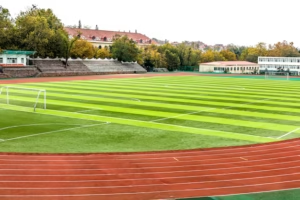https://theworldfinancialforum.com/participate/

The development of a sports ground is more than just leveling land and laying turf. It’s a powerful investment in the health, well-being, and unity of a community. Whether it’s a local school upgrading its field, a neighborhood adding facilities, or a town constructing a new sports complex, a well-planned sports ground has long-term benefits.
In this blog, we’ll explore the importance, process, and impact of developing a sports ground, and why it matters more than ever in today’s society.
Why a Sports Ground Matters
Sports grounds serve as hubs of activity, where people of all ages come together to play, train, and compete. These spaces promote:
Physical fitness through regular activity
Social interaction by bringing people together
Mental well-being through recreation and stress relief
Youth development via school or club-level training
In an era where sedentary lifestyles and screen time dominate, access to a high-quality sports ground is vital for encouraging outdoor movement and a balanced lifestyle.
Planning and Design
The first step in developing a sports ground is planning. This includes:
Assessing Community Needs: Who will use the space? Children? Athletes? The general public?
Site Selection and Surveying: Choosing the right location based on accessibility, land condition, and surrounding infrastructure.
Design Considerations: Layouts need to cater to multiple sports, spectator areas, and amenities like lighting, restrooms, and parking.
Professional architects and sports planners often work together to ensure the design is both functional and future-proof.
Infrastructure and Construction
Once the plan is in place, construction begins. This stage may include:
Land leveling and drainage systems
Installation of turf or artificial surfaces
Marking of fields and installation of goalposts, nets, or courts
Building locker rooms, seating, and fencing
Lighting and safety features for evening or high-use hours
For schools or clubs, this phase is especially exciting, as the dream slowly turns into reality. Timelines can vary depending on the scale and complexity of the project.
Environmental and Economic Impact
While sports ground development has clear fitness and community benefits, it also has economic and environmental aspects.
Economic Benefits
Creates local jobs during construction
Increases tourism through sports events
Boosts surrounding businesses (cafes, shops, etc.)
Environmental Considerations
Using eco-friendly materials
Implementing water-saving irrigation systems
Maintaining green spaces that promote biodiversity
Sustainable development ensures the sports ground supports the environment, not harms it.
Long-Term Benefits
The impact of a sports ground continues long after construction. Key long-term benefits include:
Youth Engagement: Keeps young people engaged in healthy activities, reducing chances of negative influences.
Community Events: Becomes a central venue for fairs, marathons, school sports days, and charity games.
Talent Development: Offers training space for local athletes, possibly nurturing future professionals.
Healthier Society: Encourages exercise and reduces sedentary behavior, leading to long-term health improvements.
A well-maintained sports ground becomes a source of pride and unity in the community.
Challenges and Solutions
Of course, every development project faces hurdles:
Budget constraints
Weather delays
Maintenance costs
Land acquisition issues
Solutions often involve public-private partnerships, fundraising campaigns, government grants, or sponsorships from local businesses and sports organizations.
Community involvement also helps in overcoming challenges. When people feel ownership of a space, they are more likely to protect and maintain it.
Conclusion
Developing a sports ground is an investment not just in land, but in people. It’s about creating a space where fitness, fun, and friendships flourish. From design to long-term impact, every step is a move toward a healthier, more active, and connected community.

Whether in a small village or a growing city, the development of a sports ground is a step forward—one that echoes with the cheers of today and the promise of tomorrow.